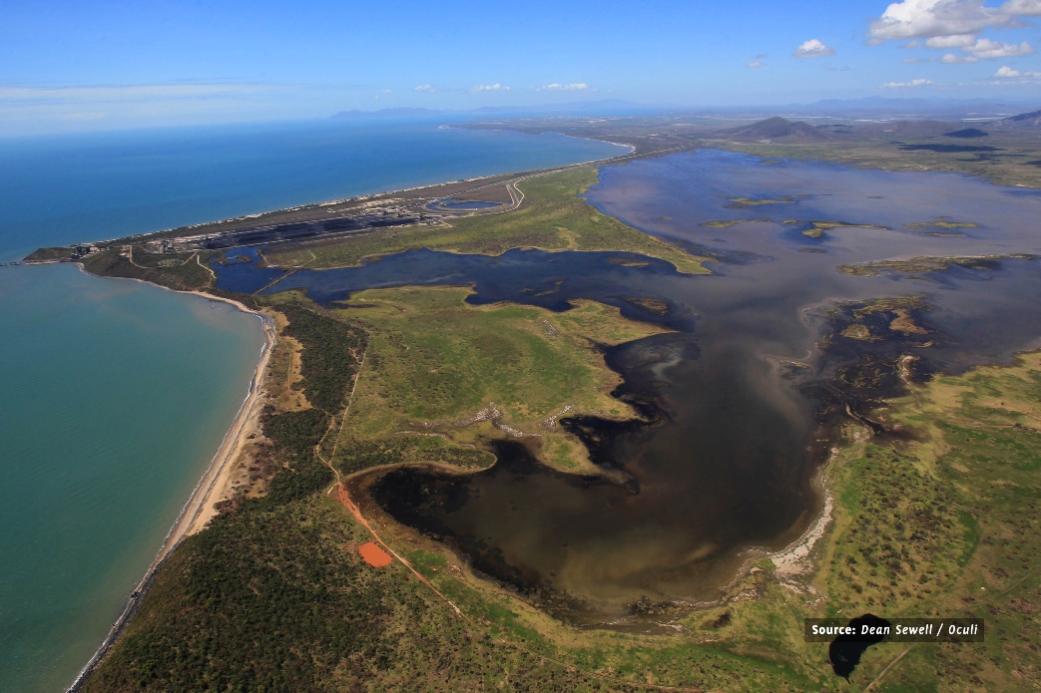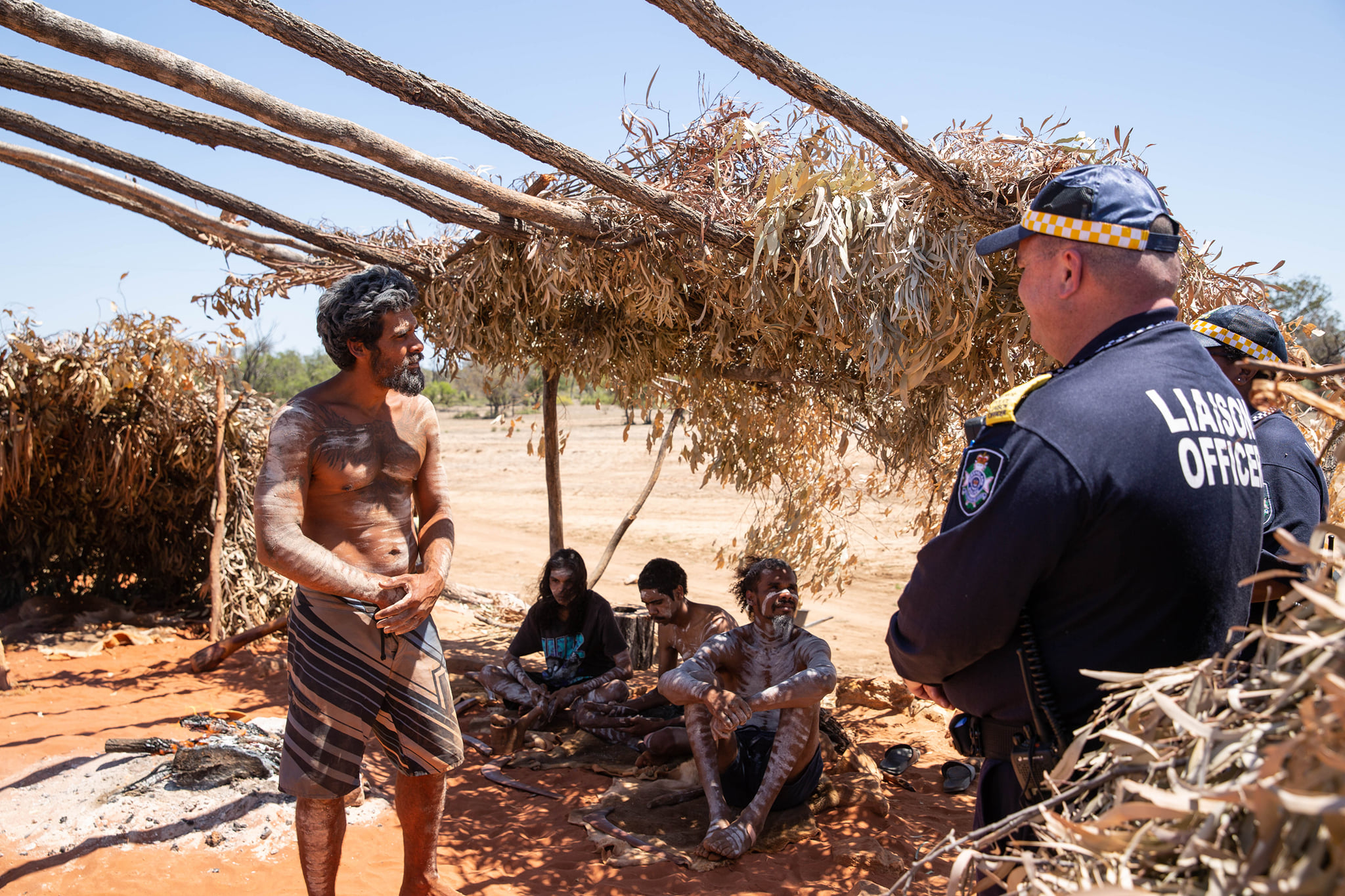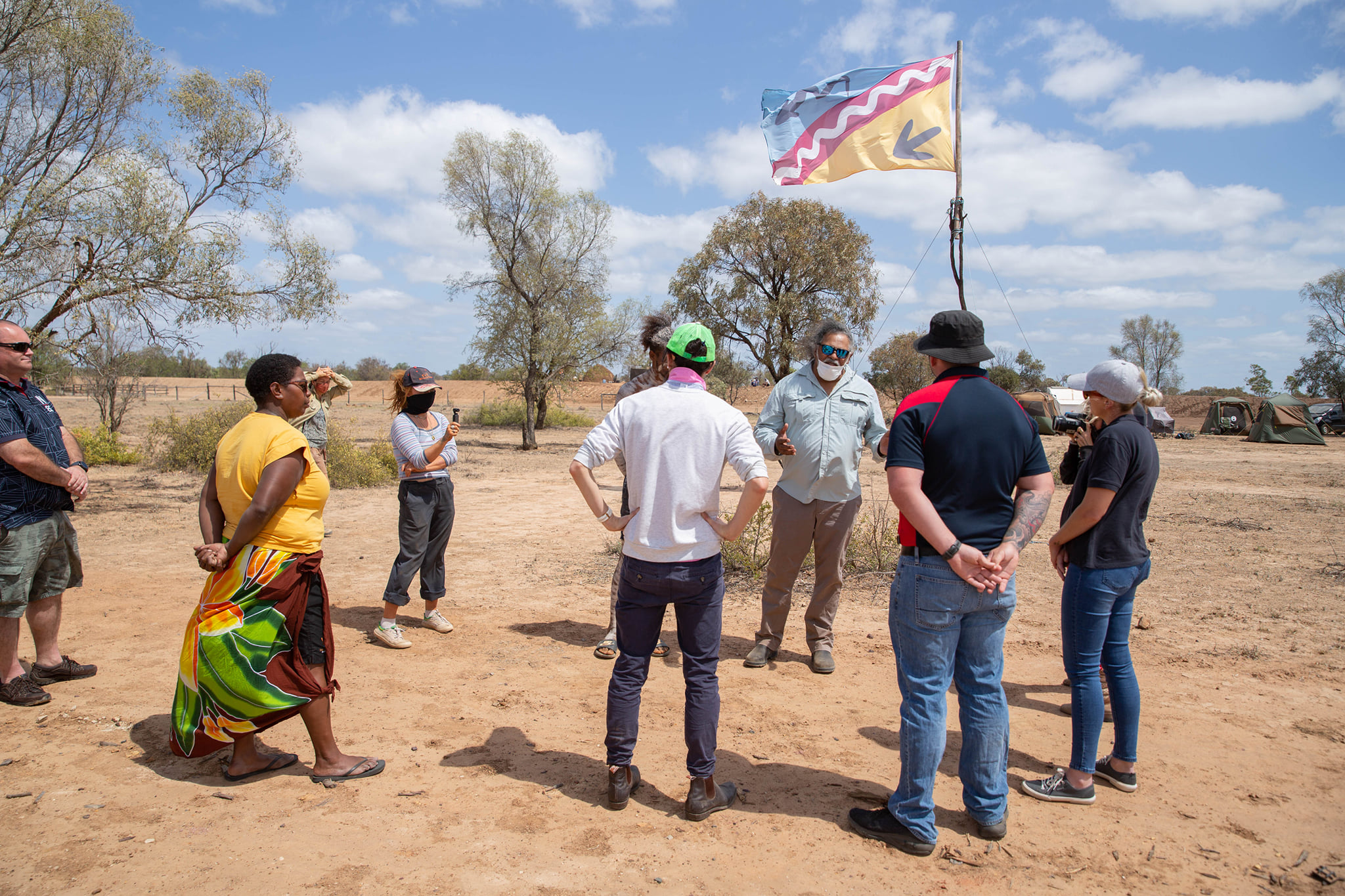Traditional owners assert their human rights on Country: the sacred Doongmabulla springs at risk

On October 1st 2021 the Prime Minister of Australia Scott Morrison said attending COP26 would require him to go into quarantine for a fourth time, disrupting his ability to "engage in my normal duties".
Given all the announcements in recent weeks - $250 million to a new program that ‘’will turbocharge the development of commercial-scale carbon capture hubs’’ announced by Minister for Energy and Emissions Reduction Angus Taylor, a statement that included Minister for Resources and Water Keith Pitt stating the technology will support the ongoing use of Australia’s abundant natural resources, including coal, $2 billion loan facility for Australian critical minerals projects, $20.7 million of investment to unlock gas, alongside with the federal governments’ Environment Minister approving 3 new coal mines, one being the Vickery coal mine despite a pending Supreme Court appeal, and an approval which has effect until 31 December 2051 and will be responsible for 370 million tonnes of carbon emissions, plus the Mangoola thermal coal mine expansion in the Upper Hunter that can run until December 31 2040, and the Tahmoor metallurgical coal mine south west of Sydney that has approval until September 1st 2061, these announcements being part and parcel of how Australia tax dollars were going to be spent months ago in a ‘gas-led recovery’, along with Mr. Morrisons comment when in Washington about how Australians are ‘good at digging things out of the ground’ - whichever senior minister is expected to represent Australia at the UN COP26 climate summit running from October 31 to November 12, is in for a long trip for a slap to a possibly already red face. A government that is granting coal mining expansion until 2061 is not planning to meet any net zero emissions target by 2050.
Further, the government plans to credit carbon abatement for large-scale projects that use controversial carbon capture and storage technology. This has been repeatedly criticised and its efficacy questioned. Under the scheme, projects will be able to sell the Australian Carbon Credit Units at bi-annual auctions or sell them on the private voluntary market. Each of the units is equivalent to one tonne of carbon emissions ‘abated’.
On Saturday Pittwater Online News received an update from the Wangan and Jagalingou Nagana Yarrbayn Cultural Custodians whose Native Title to their lands was extinguished to facilitate the Adani mine by the Queensland government in August 2019.
That had been proceeded by then Attorney-General Senator and current Ambassador to the UK George Brandis, in June 2017, working to have amendments passed to the Native Title Act. The amendments were made to overturn a Federal Court ruling that had threatened the Adani project through the refusal of some traditional owners to sign an agreement for Adani to use their land.
The federal government acted after the full court upended established precedent in February 2017 and ordered in the McGlade decision that all registered native title claimants needed to sign an indigenous land use agreement or the agreement was invalid.
"With these government amendments, there is nothing in this bill at all that does anything beyond legislatively to reverse the effect of the McGlade decision," Attorney-General George Brandis stated then.
The Native Title Amendment (Indigenous Land Use Agreements) Bill 2017 was passed by both houses of parliament on June 14, 2017. The legislation enabled Indigenous land use agreements (ILUAs) to be registered even if they have not been executed by all of the members of an affected registered native title claimant (RNTC).
While some native title holders in the Galilee Basin preferred an ILUA others did not as they wanted to retain use and custodianship of their lands.
"We are fighting this mine of mass destruction, and no matter what the Senate does in its next sitting in terms of voting for the Native Title Bill, the Federal Court will hear our case against Adani's phony deal," Wangan and Jagalingou Traditional Owners Council spokesman Adrian Burragubba said earlier in June 2017
Adani was consequently given exclusive use of the land, which they now speak of as ‘theirs’, despite the opposition of Wangan and Jagalingou Traditional Owners, and now refer to these Traditional Owners who step onto these lands as ‘trespassers’.
Despite recent announcements attesting to the opposite, in the 21st century Australian governments are still dispossessing indigenous peoples of their lands so others may profit from these.
The Wangan and Jagalingou Traditional Owners wish to access their lands to perform traditional ceremonies. They are also concerned over the impact the Adani mine will have on the, to them, sacred Doongmabulla springs.
The water aspect of this project also has dubious pushed through approvals despite alarm bells being sounded.
Adani received federal approval for its groundwater plan on April 8th, 2019, on the eve of the Morrison Government hitting caretaker mode, April 11, 2019, in the last federal election.
In February 2019, CSIRO and Geoscience Australia had advised both the Federal Environment Minister Melissa Price and the Queensland government that they did not consider Adani’s groundwater plan adequate for assessing the risk to local springs. They recommended more research drilling, monitoring and analysis, to better understand the source aquifer for the springs.
On June 7, CSIRO and Geoscience Australia responded to a series of questions from the Queensland government. They effectively reiterated their earlier concerns, including that Adani’s groundwater model is not fit for the purpose of assessing the mine’s likely impacts to the springs.
Among a raft of suggested changes to the groundwater plan, they recommended that Adani make firmer commitments to protecting the springs. However, Adani has not strengthened this part of the plan, and actions required to address impacts to the springs remain vague.
Adani was still granted the Queensland government required water licence by mid-June that allows the company to take an unlimited volume of groundwater for up to 60 years – and until June 30th 2077 in the Betts Creek allocation - in the Great Artesian Basin's northern reaches.
In May 2021 the federal court overturned an approval for the North Galilee water scheme at Adani’s Carmichael coal mine in Queensland. The scheme was to provide 12.5 billion litres of water to the coal mine annually and was earlier approved by the Australian and Queensland Governments.
Contending the approval by the Minister for Environment, the Australian Conservation Foundation (ACF) filed a case in the federal court in 2020 appealing its viability.
The federal court overturned the approval, ruling that the government made a ‘legal error’ in assessing and approving the scheme for the miner.
A Bravus, the rebranded name for Adani, spokesperson said: “We will carefully consider the judgement handed down today in the federal court regarding the validity of the federal environment minister’s previous decision to approve the North Galilee Water Scheme. The issue considered by the federal court concerned the interpretation of certain sections of the Federal Environmental Protection and Biodiversity Act.
“Regardless of today’s court judgement, construction on the Carmichael mine and rail project is well underway, and importantly, the North Galilee Water Scheme project is not required for these construction activities.
The spokesperson said that the court’s decision will not affect the construction or operation of the Carmichael Mine.
ACF CEO Kelly O’Shanassy stated: “This decision raises more doubts about the viability of Adani’s mine. Without the North Galilee Water Scheme, it’s hard to see how Adani has enough water to operate its mine.’’
Many would also have some knowledge around Australian species and how each of these have songlines and are part of a living culture for indigenous people. The endangered black-throated finch is part of this culture.
On May 2nd 2019 the Queensland Department of Environment and Science (DES) rejected Adani's management plan for the southern black-throated finch. A grass seed eating bird, this little triller needs access to the same and a riparian environment for shelter.
It is considered extinct in every state apart from Queensland where just two populations; a small one at Townsville and a flock of around 1000 only, just a year or two ago, on the traditional lands of the Wangan and Jagalingou Nagana Yarrbayn people.
The Queensland government overcame their initial rejection of Adani’s black-throated finch plan, a decision bird experts states signals it too will join the list of Australian species that are now extinct.
The Adani Carmichael coalmine and rail project has been given approval to clear or otherwise impact more than 16,000 hectares of black-throated finch habitat. There are four other mines in the Galilee Basin that have approved the clearing of more than 29,000 hectares in total of black-throated finch habitat.
Official counts of the black-throated finch at the Carmichael coal mine site recorded an 82 per cent drop between 2019 and 2020, according to the first official survey conducted for Adani.
The survey reiterates Australian governments, in the 21st century, are facilitating the extinction of this species so others may profit.
In early August 2021 credit rating agency Moody’s warned that Adani Abbot Point coal terminal is facing a refinancing risk on the $US500 million ($A670 million) of debt due next year. Adani Australia chief executive Lucas Dow, at the same time, railed against all the banks and insurers that have demurred investing, meaning the company has had to self-finance the bulk of its operations in Australia, including its subsidiary Bravus and the Carmichael coal mine.
The Abbot Point has already polluted the Caley Valley wetlands through coal-laden water being delberitely released by Adani from the Abbot Point coal terminal. Adani were fined $13 000 for this breach by the Queensland government.
Moody’s has changed its outlook for the port, known as the North Queensland Export Terminal, to negative but reaffirmed its rating as Ba2.
Moody’s states the change in outlook “reflects the rising risk associated with NQXT’s substantial $US500 million’’ bond maturing in December 2022.
Earlier this year Moody’s referred to the ongoing Indigenous opposition to the Adani project, warning miners their credit ratings could be downgraded if they did not maintain good relationships with traditional owners.
“While in this case [Adani] was ultimately given exclusive possession to the land and granted approvals for its mine, the inability to maintain social licence to operate with some members of the local Indigenous community adds another layer of risk to a project that was already facing challenges in maintaining social licence to operate with the broader community because of environment concerns,” the Moody’s report states.
“This may also add further complexity to a project where some participants from the investment community have signalled an unwillingness to provide funding.”
On October 9, 2021 Pittwater Online News received an update from the Wangan and Jagalingou Nagana Yarrbayn Cultural Custodians about their efforts to save their sacred Country which reads;
Dear friends, Waddamulli (hello).
After three days of talks, Queensland Police have returned to our ceremonial ground, located across from Adani’s mine pit, with a commitment to investigate our grievance and pressure the Queensland Environment Minister to conduct an independent investigation into Adani’s groundwater usage and the impact on the sacred Doongmabulla springs.
Police have also said they have no intention of moving us on, and that they recognise our cultural rights to conduct ceremony. This is historic – we have managed to stave off police, hold the space, and assert our human rights to perform ceremony unhindered while on a mining lease under section 28 of the Human Rights Act.
This could be the turning point in the state of Queensland, if not the country, for Indigenous peoples’ rights to say NO to mining companies.

W&J Cultural Custodian Coedie McAvoy in negotiations with Queensland Police at Waddananggu. Image supplied
We have been conducting our ongoing ceremony called Waddananggu, "The Talking", for more than 6 weeks. During this period, at least one W&J person has been in the sacred talking circles at all times, waiting for other tribes to come and talk.
As well as asserting W&J human rights, we have also created the path for non-Indigenous people to support Aboriginal ceremonies and not be hindered by a mining company or Queensland Police. Queensland Police now also acknowledge that non-Indigenous people have a human right to be part of a ceremony under invitation.
This is big, this is the first time in Australian history where non-Indigenous people have protection to help Indigenous people by being part of a ceremony.

Senior W&J Cultural Custodian Adrian Burragubba speaking on the site. Image supplied
Our fight against Adani is a fight for our fundamental human rights.
Our right to life, the right to food, and the right to health, directly rely on the survival of our baseline food source and water. Wangan and Jagalingou people, while occupying and living off the land, are faced with being forced into food insecurity by Adani’s massive destructive mine and the harmful effect it is having on the wildlife and groundwater.
Our right to self-determination, which includes the right to freely pursue economic, social and cultural development, is under threat from Adani’s destructive impact on the climate.
What’s more, free, prior and informed consent, which must be secured before any action is taken that will adversely affect Indigenous peoples, has never been granted.
We know first-hand that construction, development and operation of Adani’s coal mine is already having disastrous effects, and will only exacerbate existing socio economic, political and cultural inequalities, and exact disproportionate effects on members of our community living in the area.
The Queensland Government is failing to ensure the livelihood of W&J Cultural Custodians and our people, and is permitting the erosion of our diverse cultures that enrich both land and people alike.
We must stay vigilant out on Country to keep pressure on the Queensland Police Service, and the Queensland Government to open an independent investigation into Adani’s impacts on precious groundwater.
We as Wangan and Jagalingou cultural custodians need your help to stay out on Country, to keep the pressure on so we can expose this destructive mine through an independent investigation.
If you would like to participate in the Waddananggu ceremony and you would like to travel to our camp, register here. Alternatively, if you are physically unable to come, we welcome any contribution you can make to show your support for our ongoing struggle. Just drop us a personal message over Facebook.
Yours for Country,
Adrian Burragubba,
Elder and spokesperson
Wangan and Jagalingou Nagana Yarrbayn Cultural Custodians
On Saturday October 9th Northern Beaches Greens stated they welcomed police respect for Wangan and Jagalingou Traditional Owners’ rights to pursue their cultural practices and access their land, in the fight to protect it from the Adani coal mine.
Greens Pittwater council candidate Pru Wawn said the Queensland police’s actions are a really positive development for all Australians.
“Hopefully this is a turning point for Indigenous peoples' rights to say ‘No’ to mining companies,” Ms Wawn told Pittwater Online News.
“The Queensland police have said they have no intention of moving them on and that they recognise their cultural rights to conduct ceremony.
“This means that Wangan and Jagalingou Talking circles are continuing during the Waddananggu ceremony - located right near the Adani mine site.”
Ms Wawn said the Wangan and Jagalingou people have earned huge respect across the country for standing strong against Adani's takeover of their land, after their ownership was extinguished by the Federal and Queensland governments and continuing despite Elder Adrian Burragubba being bankrupted by challenging the decision.
“We are all learning about the incredible resilience of the Traditional Owners of this land, who just keep picking themselves up, refusing to give in,” she said.
Ms Wawn is a long-term campaigner against the Adani mine and for renewable energy. She was the Greens candidate for Mackellar at the 2019 federal election and is also standing third on the Greens Pittwater ticket at the December council elections.
Also worth noting is our first ever Member for Mackellar, Bill Wentworth was a long-term campaigner to have the Australian Constitution changed so that our indigenous people could finally be counted as citizens, or people of this place, and became the first Minister for Aboriginal Affairs.
In a statement to The Guardian on October 3 Adani said the group at the mine site were “anti-fossil fuel activists” who were unlawfully trespassing.
“The complaints are now with Queensland Police Service to appropriately deal with,” the miner said.
“We are supportive of our traditional owners undertaking cultural practices and ceremonies on their traditional lands and as a responsible landholder we will continue to ensure that when people do wish to access our land properties, they are able to do so in a planned, safe, and respectful manner.
“However, we won’t tolerate criminal activity on our mining lease, nor anti-fossil fuel activist group Frontline Action on Coal cloaking their anti-coal protest camp and trespassing under the guise of traditional activity.”
When initially approved by then Federal Environment Minister Greg Hunt on October 14th, 2015 the Adani Carmichael mine was granted approval that has effect until June 30th, 2090.
Original 2012 documents prepared by Adani show a plan to mine thermal coal until 2103.
Australia Net Zero in Emissions by 2050?
Always Was Always Will Be Aboriginal Land?
COP26 at Glasgow on October 31 may be interesting for local pundits – if only to see who has been sent to crow about ‘how good Australians are at digging things out of the ground’ - and approving extinctions.